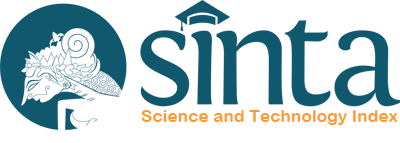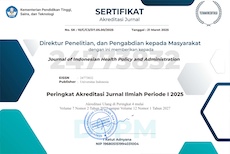Abstract
Background: At a time when people believe in the efficacy and minimal risk of traditional medicines, government agencies that oversee traditional medicines often find chemicals that are intentionally added to traditional medicines. The purpose of this study is to present the findings of Undeclared Substance that have been added to traditional medicines for ten years, to analyze their relevance to the real situation related to diseases or health problems in Indonesia, and to examine the violations of related policies. Methods: This study used an observational design based on quantitative and qualitative data and analyzed descriptively. Quantitative data based on Traditional Medicines Monitoring data are published through the website (www.pom.go.id) in the category of public warning OT-BKO in 2012-2021. Further analysis, conducted in-depth interviews to explore the root cause of the problem at the level of policy makers. Documents and literature review were conducted to analyze the findings. Interviews with policy makers were also conducted to confirm findings and explore problems that were not obtained from documents and literature. Results: For ten years, Paracetamol was the most common type of Undeclared Substance found every year in traditional medicines. This is relevant to the high number of complaints related to indications for the use of Paracetamol, both from reports from health facilities and results from household surveys. Meanwhile, the findings of the Ephedrine Undeclared Substance - with indications for reducing respiratory disorders - only appeared in 2021. These findings are not only relevant to the COVID-19 pandemic and the entry of traditional medicines from foreign aid, which also contain Ephedra sinica. The Undeclared Substance' findings are inconsistent with the objectives of a number of regulations ranging from those related to traditional medicine to consumer protection. Conclusion: The findings of Undeclared Substance on traditional medicine were relevant to public health problems at that time. The emergence of traditional medicines with Ephedra shows that domestic producers do not understand the safety of traditional medicines. In addition, the existing policies and violations of these policies have not been understood by traditional medicine manufacturers.
Bahasa Abstract
Latar Belakang: Di saat masyarakat percaya dengan khasiat dan minimnya risiko obat tradisional, lembaga pemerintah pengawas obat tradisional kerap menemukan bahan kimia yang sengaja ditambahkan pada obat tradisional. Tujuan studi ini menyajikan temuan Bahan Kimia Obat (BKO) yang ditambahkan dalam obat tradisional selama sepuluh tahun, menganalisis relevansinya dengan situasi riil terkait penyakit atau masalah kesehatan di Indonesia, serta menelaah pelanggaran kebijakan yang terkait Metode: Penelitian ini dilakukan dengan desain observasional menggunakan data kuantitatif dan kualitatif. Data kuantitatif berdasarkan data Pengawasan Obat Tradisional dipublikasikan melalui website (www.pom.go.id) dalam kategori public warning OT-BKO tahun 2012-2021. Analisis selanjutnya, dilakukan wawancara mendalam untuk menggali akar permasalahan pada level pemangku kebijakan. Dokumen dan telaah literatur dilakukan untuk menganalisis hasil temuan tersebut. Wawancara terhadap pemangku kebijakan juga dilakukan untuk memastikan temuan dan menggali masalah yang tidak didapatkan dari dokumen dan literatur. Hasil: Selama sepuluh tahun, Paracetamol merupakan jenis BKO yang paling banyak ditemukan setiap tahunnya pada obat tradisional. Hal ini relevan dengan tingginya keluhan terkait indikasi penggunaan Paracetamol, baik dari laporan fasilitas kesehatan maupun hasil survei rumah tangga. Sementara, temuan BKO Efedrin- dengan indikasi untuk mengurangi gangguan pernafasan- baru muncul pada tahun 2021. Temuan ini selain relevan dengan kondisi Pandemi COVID-19 dan masuknya obat tradisional yang berasal dari bantuan luar negeri, yang juga mengandung Ephedra sinica. Temuan BKO ini tidak sesuai dengan tujuan sejumlah peraturan mulai dari yang terkait obat tradisional hingga perlindungan konsumen. Kesimpulan: Temuan BKO pada obat tradisional relevan dengan masalah kesehatan masyarakat pada waktu tersebut. Kemunculan obat tradisional dengan Ephedra menunjukkan produsen dalam negeri belum paham terhadap keamanan obat tradisional. Selain itu, kebijakan yang telah ada dan pelanggaran kebijakan tersebut belum dipahami oleh produsen obat tradisional.
Recommended Citation
Dianasari, Widha and Nadjib, Mardiati
(2022)
"SUPERVISION OF TRADITIONAL MEDICINES CONTAINING UNDECLARED SUBSTANCE: ANALYSIS OF INDONESIAN FDA MONITORING DATA FOR 2012 - 2021,"
Journal of Indonesian Health Policy and Administration: Vol. 7:
No.
1, Article 4.
DOI: 10.7454/ihpa.v7i1.5858
Available at:
https://scholarhub.ui.ac.id/ihpa/vol7/iss1/4
Included in
Health Policy Commons, Health Services Administration Commons, Health Services Research Commons




